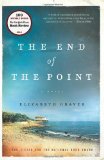Summary | Excerpt | Reading Guide | Reviews | Beyond the Book | Read-Alikes | Genres & Themes | Author Bio

This article relates to The End of the Point
 Elizabeth Graver's novel is set on a (fictional) point jutting out into Buzzards Bay, which borders Massachusetts and is tucked in between the southwest coast of Cape Cod, Plymouth and Bristol Counties on the mainland. New Bedford, which was the world's leading whaling port in the nineteenth century, is the most major city on the bay.
Elizabeth Graver's novel is set on a (fictional) point jutting out into Buzzards Bay, which borders Massachusetts and is tucked in between the southwest coast of Cape Cod, Plymouth and Bristol Counties on the mainland. New Bedford, which was the world's leading whaling port in the nineteenth century, is the most major city on the bay.
Buzzards Bay was, as Graver suggests in her forward, originally occupied by the Wampanoag tribe and was sold to a group of thirty-four Colonial shareholders in 1652 for "30 yards of cloth, 87 moose skins, 15 axes, 15 hoes, 15 breeches, 8 blankets, 2 kettles, one cloak, 2 English Pounds in Wampum, 8 pairs of stockings, 8 pairs of shoes, 1 iron pot, and 10 shillings." The bay was given its name by colonists who thought that one of the many ospreys circling the island was actually a buzzard.
 Birds and other wildlife do play an important role in the ecosystem of Buzzards Bay. In 1985, the federal government designated it an "estuary of national significance," and the Buzzards Bay Project (now the National Estuary Program) was founded to protect this fragile region from pollution, erosion, and other threats. Late Senator Ted Kennedy was part of the initiative to provide federal funding for this initiative.
Birds and other wildlife do play an important role in the ecosystem of Buzzards Bay. In 1985, the federal government designated it an "estuary of national significance," and the Buzzards Bay Project (now the National Estuary Program) was founded to protect this fragile region from pollution, erosion, and other threats. Late Senator Ted Kennedy was part of the initiative to provide federal funding for this initiative.
Despite these efforts, though, the bay remains at risk from human accidents and natural disasters. In 1991, Hurricane Bob brought much damage to the region, and in 2003, a spill of 98,000 gallons of fuel oil from the barge Bouchard No. 120 caused high bird mortality and affected more than ninety miles of shoreline.
Photograph of Piping Plover by S. Mierzykowski, USFWS
Filed under Places, Cultures & Identities
![]() This "beyond the book article" relates to The End of the Point. It originally ran in March 2013 and has been updated for the
April 2014 paperback edition.
Go to magazine.
This "beyond the book article" relates to The End of the Point. It originally ran in March 2013 and has been updated for the
April 2014 paperback edition.
Go to magazine.
Your guide toexceptional books
BookBrowse seeks out and recommends the best in contemporary fiction and nonfiction—books that not only engage and entertain but also deepen our understanding of ourselves and the world around us.